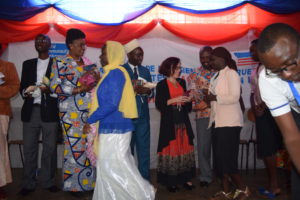Educational authorities in Kayanza Province affirm that school girls often miss classes during the menstrual period. These girls say they do not have money to purchase sanitary pads.

The Director of SACODE and the US Ambassador to Burundi alongside educators in Kayanza distributing sanitary pads to school girls
“Our survey revealed that the majority of rural female students cannot afford to buy sanitary pads every month to manage their menstrual period adequately. They use pieces of torn clothes that are dirty. This often causes them genital infections and allergy, “said Grace Françoise Nibizi, Director of SaCoDé, a local NGO that promotes communities’ health for development, on April 5 in a workshop that was held on menstrual hygiene for school girls in Kayanza . Nibizi regrets that girls often miss classes in the menstrual period due to the lack of money to buy hygienic pads.
Yvonne Kwizera, a student at Kayanza Technical School, says she prefers to stay home instead of being humiliated in front of her male classmates and teachers during the menstrual period. “As I use pieces of torn clothes, I cannot stay at school all day long without seeing menstrual blood on my clothes. That is the reason why I prefer to stay home,” Kwizera says.
Marguerite Mukeshimana, a supervisor at Kayanza Technical School, says girls do not study quietly during their menstrual period. “Either they go out of class or cut class,” she says. “The management of the menstrual period among young girls is a concern for parents and educators. We have realized that some students missed examinations during periods, “said Desire Hatungimana, Provincial Director of Education in Kayanza. He asks for support for students who cannot afford to buy sanitary pads.
To enable Burundian girls to study well, SACODE has made washable and reusable pads for girls and women who have no money to buy sanitary pads each month thanks to the funding from the United States Embassy in Burundi. Those pads are made from a 100% cotton fabric that does not cause allergy or genital infections. They have straps that allow students who have no underwear to wear it.
On that day, SACODE distributed 200 sanitary pads to the school girls who had attended the workshop. The director of SACODE promises that another 800 sanitary pads will be distributed to the school girls from Kayanza province before the end of this month.
That local NGO plans to distribute 18,000 sanitary pads to young female students throughout the country. Each province will be given 1,000 pads. “SACODE recorded 100,000 girls who need to be assisted with sanitary pads. However, since we do not have enough money, we will only distribute 1,000 per province. We will privilege the poorest ones, “says Nibizi adding that SOCODE will continue to plead for all the girls and women in need of sanitary pads so that they should be served.



















 IWACU Open Data
IWACU Open Data

